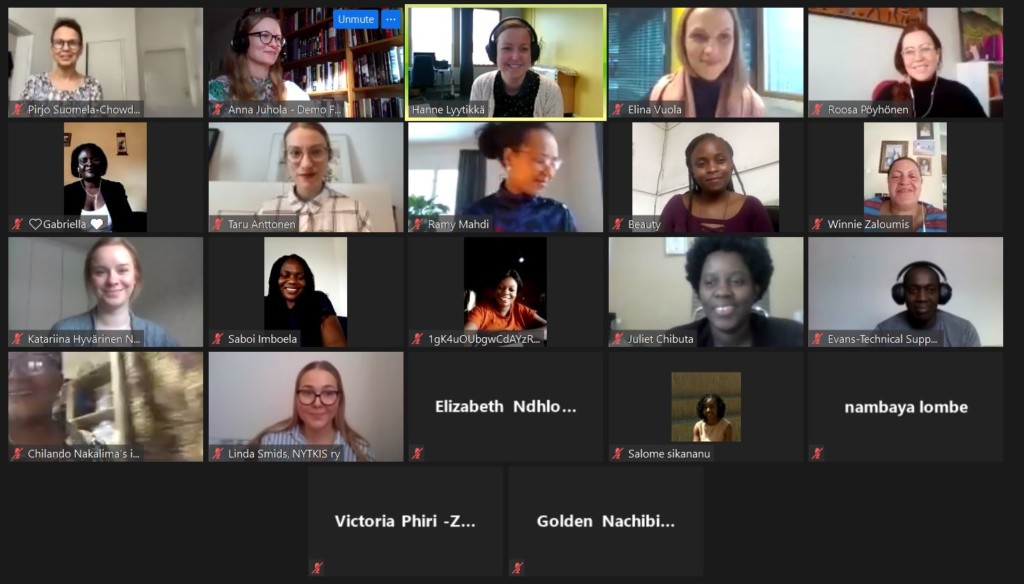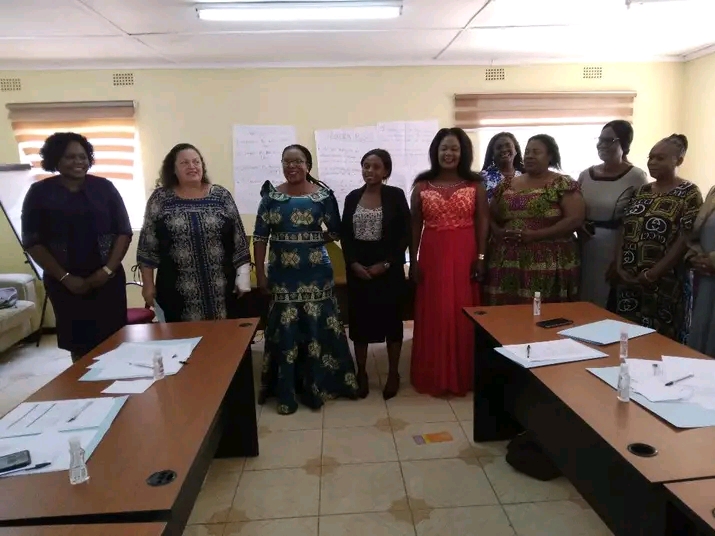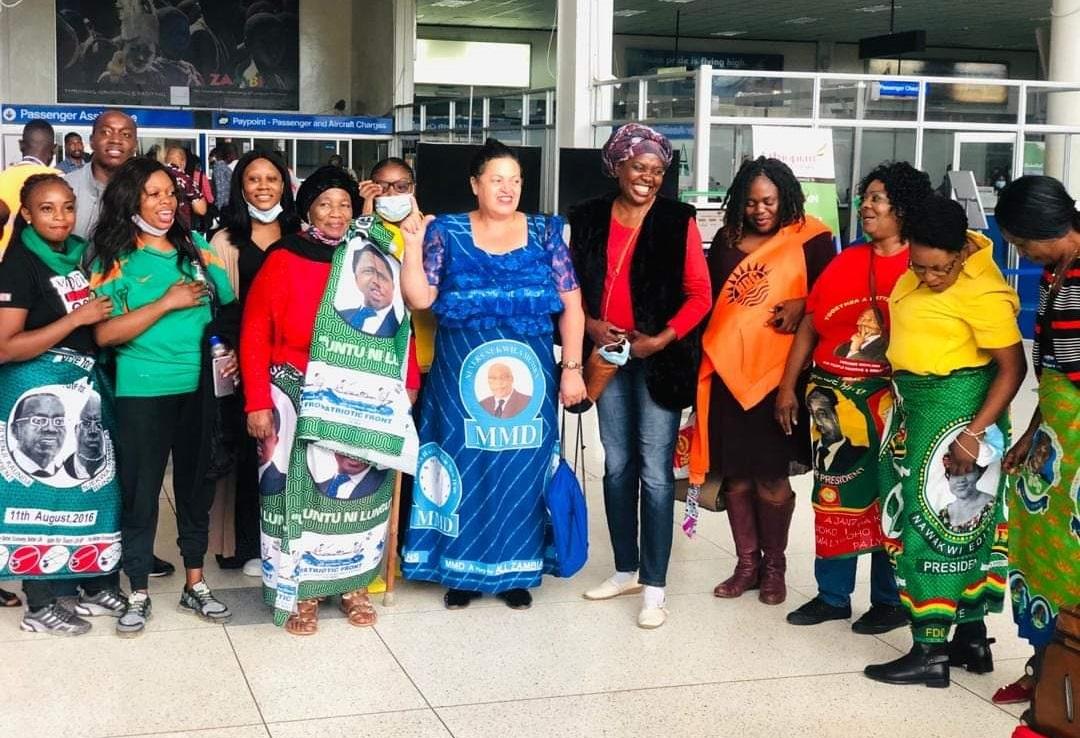The co-operation between Demo Finland and the Zambia National Women’s Lobby (ZNWL) to support and strengthen women’s political participation at the local level in Zambia started in 2013. The programme ended at the end of 2022, and its most significant result, according to an external evaluation, was the creation of women’s multi-party dialogue platforms. Before 2013, such platforms did not exist, and it was rare for women from different political parties to interact and share ideas and information. These platforms have built trust across political party lines and provided a neutral space where women politicians can network and collaborate on issues they find important.
The underrepresentation of women at different levels of decision-making in Zambia is striking: The proportion of women in the Parliament is 15% and in Local government councils only 8%. Women face several obstacles in participating in politics, such as patriarchal attitudes and low income and education levels. ZNWL estimated that women’s participation in the August 2021 elections was reduced by the tense political atmosphere, electoral violence, harassment, corruption in candidate nominations, candidate fees and strict educational requirements for candidates. In Zambia, candidates are required to have completed 12 years of schooling to qualify to participate as candidates in the elections. This makes it difficult especially for women to become candidates, because the proportion of boys who have completed secondary education is higher than girls.
The dialogue platforms have built trust across political party lines and provided a neutral space where women politicians can network and collaborate.
Over the 10 years of implementation, Demo Finland and ZNWL’s programme has strengthened the knowledge and leadership skills of female local government councillors, supported political parties in promoting gender equality and facilitated women’s multi-party co-operation. Women’s dialogue platforms operate both at the local level in three districts (Kaoma, Kapiri Mposhi and Lusaka) and at the national level. In addition, trainings have been organised for female candidates, women aspiring to become candidates, and campaign managers for women candidates.
The programme has also included international exchange of experiences between women politicians in Zambia and Finland. Zambian local government councillors and members of the dialogue platforms have travelled to Finland for study visits twice over the past ten years, and at the end of 2020, the female politicians who are members of the platform travelled to Rwanda for a study visit. In addition, representatives of the Women’s Network of the Zambian Parliament have visited Finland to learn about gender equality in politics. Individual politicians from Finland have also participated in seminars to train Zambian women politicians, as well as share their own expertise and experiences.

During the years 2019–2022, mentoring co-operation has been carried out in collaboration with the Coalition of Finnish Women’s Associations NYTKIS. Zambian and Finnish municipal politicians have met in online mentoring sessions, where they have discussed, among other things, women’s multi-party co-operation and violence against women in politics as well as the parties’ actions to prevent it. Mentoring sessions have been highly valued as a platform to exchange experiences on good practices in politics and for peer support. Although the political context is different, women still face similar challenges in politics in Zambia and Finland.
More competence, co-operation and meaningful participation
During the programme, the Zambian female councillors’ ability to influence decision-making has increased and they have more knowledge and skills related to the role of politicians and democracy. The programme has strengthened the effective and active participation of women in their political parties and political processes. In addition to targeted training, the creation of dialogue platforms at both national and local levels have had a significant impact on women’s political careers. One of the greatest impacts is that more than half of the platform members have progressed to more influential positions in their political parties, some even to party leadership.
Now gender equality is practiced and discussed at all levels and in all structures of political parties.
Trainings on gender equality have been organised for political party leaders, and parties have been supported in making gender equality plans. In addition, advocacy meetings have been held with political party leaders to advocate for the support and adoption of women, especially before elections. As a result, the ZNWL project team has noticed an increased awareness of gender equality among political parties. At the beginning of the project, the executive committees of the political parties paid little attention to the topic and did not have much knowledge about the importance of women’s political participation, but now gender equality is practiced and discussed at all levels and in all structures of the parties. For instance, most political parties have co-opted women in various committees, including the candidate adoption committees.
A significant change has also been seen in the increase in multi-party co-operation. The networking and increased trust among female politicians have led to constructive dialogue and concrete issue-based co-operation. It is often difficult for women to push for changes and raise issues they consider important in their own political parties, but together, women representing different parties can make their voice heard and take a stand more effectively.

The ZNWL Executive Director Juliet Chibuta comments on the impact that the project has had on women politicians in the platform:
“The project has led to the women politicians in the platform to unite and speak against issues that disadvantage them in politics like violence, discrimination and harassment. The women also support each other despite coming from different political parties. They share ideas on how to succeed in politics and address challenges that they encounter. Previously before the platform was formed, women from different political parties were not interacting as they were scared of being perceived to have defected to another party. Despite the end of the project, the women have continued meeting regularly to discuss issues that affect them.”
Work for more inclusive politics continues
Although Demo Finland and ZNWL’s programme has ended, the National Women in Politics Platform continues its activities and has organised itself independently. Through the platform, women’s co-operation across political party lines continues. The platform also plans to continue monitoring the political parties’ progress in producing gender equality plans.
Despite the end of the programme focusing on women’s political participation, Demo Finland’s partnership with ZNWL continues. Demo Finland and ZNWL, in co-operation with Disability Rights Watch (DRW), have supported the political participation of persons with disabilities (PWDs) and the inclusiveness of the multi-party system since 2020. So far, networks of politicians with disabilities have been launched in two municipalities, and five parties have started to draft disability inclusion plans.
The project will continue in 2023–2024 with the purpose of deepening the already achieved results by strengthening the dialogue of PWDs across party lines, supporting political parties in finalising disability inclusion plans, raising awareness in parties about the participation of PWDs and continuing a previously launched mentoring programme for PWDs interested in participating in politics.

